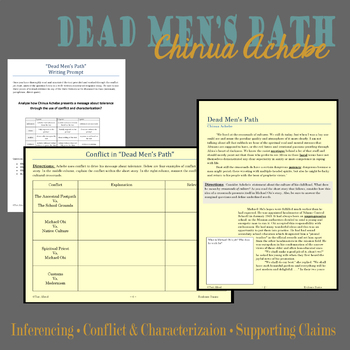Dead Men's Path - Supporting Claims
Tori Allred
72 Followers
Grade Levels
8th - 10th
Subjects
Resource Type
Standards
CCSSRL.9-10.1
CCSSRL.9-10.3
CCSSRL.9-10.4
CCSSRL.9-10.6
CCSSW.9-10.9
Formats Included
- Word Document File
Pages
9 pages
Tori Allred
72 Followers
Also included in
- "The Medicine Bag" is the perfect vehicle for discussing character development and the dynamic character. My students read together in small groups discuss the major topics as they come to them. For that, this format is perfect. Of course, I still pop by and give feedback and listen in to the converPrice $15.12Original Price $18.90Save $3.78
Description
In my search for short, meaningful texts, I stumbled upon this short story by Chinua Achebe. Dead Men's Path allows us as teachers to continue the ongoing conversation about stereotypes, bias and even racism while also teaching the mechanics and structure of writing.
Here, I have used the conflict between the Missionary school and the African customs presented by Achebe as a starting point for a lesson on making inferences and supporting claims.
Pages included:
- The full text formatted for annotation and vocabulary
- Critical Thinking question and marginal questions to further understanding
- A jot chart for using conflict to identify message and claim
- Supporting Evidence Graphic Organizer
- Writing Prompt with rubric
Total Pages
9 pages
Answer Key
Rubric only
Teaching Duration
3 days
Report this resource to TPT
Reported resources will be reviewed by our team. Report this resource to let us know if this resource violates TPT’s content guidelines.
Standards
to see state-specific standards (only available in the US).
CCSSRL.9-10.1
Cite strong and thorough textual evidence to support analysis of what the text says explicitly as well as inferences drawn from the text.
CCSSRL.9-10.3
Analyze how complex characters (e.g., those with multiple or conflicting motivations) develop over the course of a text, interact with other characters, and advance the plot or develop the theme.
CCSSRL.9-10.4
Determine the meaning of words and phrases as they are used in the text, including figurative and connotative meanings; analyze the cumulative impact of specific word choices on meaning and tone (e.g., how the language evokes a sense of time and place; how it sets a formal or informal tone).
CCSSRL.9-10.6
Analyze a particular point of view or cultural experience reflected in a work of literature from outside the United States, drawing on a wide reading of world literature.
CCSSW.9-10.9
Draw evidence from literary or informational texts to support analysis, reflection, and research.



